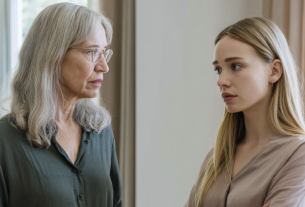Sometimes, behind quiet family dinners, devious plans take shape. But even the most carefully calculated schemes have one unforeseen variable—your intuition.
An Unpleasant Conversation Through the Wall
The smell of roasted duck still hung in the air, a reminder of the recent feast. Zhenya slipped off her shoes and walked barefoot over the cool laminate, carrying cups to the kitchen. A soft murmur of voices remained in the living room—her mother-in-law and Timofey were whispering about something. An ordinary family scene after a celebration… yet Zhenya suddenly felt that something was wrong.
She tiptoed back to the hallway and froze by the door. The voices were muffled, but the words came through clearly:
“Now’s the time, while she’s pliable,” hissed Svetlana Arkadyevna. “She’ll sign the power of attorney—and that’s it, consider it yours! Later will be too late. Do you even understand how much this is worth?”
Timofey sighed, hesitated:
“I get it, Mom… But what if she suspects something? Zhenya isn’t stupid.”
“As if that matters!” the mother-in-law snorted. “Tell her it’s for convenience. So you can pay everything quickly, without red tape. Women fall for that. The main thing—don’t mumble!”
Zhenya pressed her hands to her chest, trying to calm her pounding heart. They were talking about her. About a power of attorney. About her apartment, the one she’d honestly bought before the marriage, after years of setting aside money from every paycheck.
Their voices kept whispering in the half-dark:
“You know,” lectured Svetlana Arkadyevna, “she’s soft, compliant. The key is not to push. Be gentle. Kind. And don’t forget to say, ‘For the sake of the family.’”
Zhenya stepped back toward the kitchen, nearly bumping her shoulder against the doorframe. Her legs went weak; a low hum filled her head.
“For the sake of the family…”
How many times had she said those very words herself, yielding in small things for the sake of peace at home! But now that “for the sake of the family” was being turned against her.
She understood: the game started tonight. And the stakes were far too high.
Zhenya lowered her hands into the sink and began washing the dishes on autopilot, but her thoughts had already flown far away.
“No,” a cold thought flashed inside her. “I won’t give up what I’ve fought for all my life. Even if I have to play by their rules.”
A bright peal of laughter from her mother-in-law came from behind the wall.
Zhenya dried her hands on a towel and walked to the window slowly, very calmly. Beyond the glass, a few lights burned in other people’s apartments. And in each of them—its own story.
Only her story wasn’t finished yet.
First Suspicions
By morning, Timofey was like a different person. He bustled around the kitchen, brewed coffee, took Zhenya’s favorite chocolates down from the cupboard. He even got ready for work with unusual fussiness, peering into her eyes as if searching for the right moment.
“Zhen, I’ve been thinking…” he began carefully, sitting down across from her at the table. “We should make things simpler for you with the apartment. You never know… payments, documents… If something comes up, I could handle the paperwork for you. So you don’t have to worry about anything.”
Zhenya took a slow sip of coffee without taking her eyes off him. Inside, everything tightened: here it was.
“How exactly?” she asked, keeping her voice even.
“Well, we could draw up a power of attorney,” he blurted out. “So I could act on your behalf—pay the bills, handle issues. Purely technical. No tricks.”
He was smiling too widely. Too unnaturally.
Zhenya nodded as if agreeing.
“Interesting idea… I’ll think about it.”
Timofey had clearly expected a different answer. He tensed almost imperceptibly, then quickly put his caring-husband mask back on.
“Of course, think it over! I just want to make things easier for you.”
He left for work, trailing a cloying trace of cheap cologne and a sticky sense of dread.
Zhenya sat at the table for a long time, listening to the old five-story building wake up: doors slamming, slippers shuffling along the stairwell.
“So they’ll apply pressure through ‘care,’” she thought.
Zhenya wiped her hands on her apron and picked up her phone. Her fingers dialed the number on their own.
“Natash, hi,” she said, trying to sound cheerful. “Are you busy today? I need to talk. About… powers of attorney.”
On the other end, her friend Natalia Sergeyevna—an experienced attorney with flawless instincts—instantly caught the worry in her voice.
“Of course, Zhenya. Stop by after lunch. And don’t worry ahead of time, all right?”
Zhenya hung up and exhaled.
Today she would still smile. Today she would still endure.
But inside her, resolve was hardening. They thought she was soft? Easily swayed? Let them go on thinking so.
The real fight was only beginning.
Polite Pressure
Dinner that evening was unusually festive. Svetlana Arkadyevna, wearing her “dress” blouse with pearl buttons, had personally brought over hot pirozhki and a roast in a ceramic dish. The air was filled with the scent of bay leaf and spicy pepper.
Zhenya already knew: there would be a new attempt tonight.
They sat at the table, trading idle remarks about the weather and the neighbor on the third floor who had “dragged home some riffraff again.”
Then, when Timofey poured himself a second shot of bitters, his mother launched her script:
“Zhenya, my dear,” she began in a syrupy voice that instantly twisted something inside Zhenya, “you understand what times we live in… Everything’s so unpredictable. Illnesses, laws… And your apartment is a good one, spacious. God grant you health, of course, but what if…”
She paused and took a noisy sip of tea.
“You should make a power of attorney out to Timka. So if something happens—everything’s under control. Otherwise it’ll be running around, hassle, courts…”
Timofey nodded, staring into his plate.
“Really, Zhen. I’m only worried about you. I don’t need anything of yours.”
Zhenya smiled. Calmly. Exactly as Natalia Sergeyevna had taught her over tea:
“Their weapon is feigned concern. Yours is feigned consent.”
“Good idea,” she nodded. “We should.”
And as if in passing, she added:
“Only we’ll do it properly. Through a notary. So everything is strictly in my interests.”
Her mother-in-law flustered.
“No need for complications, of course! Just a standard power of attorney! None of this legal fuss.”
Gently, almost tenderly, Zhenya replied:
“Oh, come now, Svetlana Arkadyevna. These days you can’t do without lawyers. Better to do everything right from the start, so there are no misunderstandings later.”
Timofey cleared his throat.
“I’ll arrange it. There’s a good notary in the center. We’ll go tomorrow.”
Zhenya nodded and got up to clear the table. Behind her, mother and son exchanged glances. They thought they’d won.
While Zhenya, hands in the dishwater, was already laying out her defense plan in her mind.
She would go with them to the notary.
But she would play her own game there.
And this time—she’d play to win.
Preparing the Defense
That same evening, after the two had left, Zhenya rang Natalia Sergeyevna’s buzzer without taking off her coat.
“Come in, Zhen, I’ve already put the kettle on,” her friend answered warmly.
Natalia’s place always smelled of cinnamon—and something reliable. The home was full of bookshelves, soft throws, and the unshakable sense that anything can be solved if you think it through properly.
Zhenya sank onto the couch, took the teacup from her friend, and for the first time all day allowed herself to relax. Only now did she realize how badly her hands were shaking.
“Natalia… They want me to sign a power of attorney for the apartment,” she exhaled. “A full one.”
Natalia nodded silently, like a doctor listening to a patient.
“All right, listen carefully,” she began, calm and firm. “There are different kinds of powers of attorney. If they’re aiming for a full one, that’s almost like transferring all rights to the apartment. They could sell it, mortgage it, even reassign it without you knowing.”
Zhenya paled.
“But there’s another option,” Natalia went on. “You can issue a power of attorney with restrictions. Only for paying utilities, for example. Or only to represent your interests within very narrow limits. Better yet—a power of attorney explicitly without the right to dispose of or transfer the real estate.”
Zhenya listened, catching every word.
“And one more thing.” Natalia narrowed her eyes. “Ask the notary to read the text out loud in their presence. They’re counting on you to sign without reading. But if it’s read aloud, all limitations will be voiced. And if necessary—I know a notary I trust. No tricks there.”
Zhenya nodded, feeling a strange, cold determination rising inside—not fear.
“I understand,” she said, clasping her hands together. “I’ll agree to go to the notary. Happily. And then…”
Natalia smiled for the first time that evening.
“And then they’ll be very surprised.”
Zhenya came home late. As she crossed the courtyard, she looked up at the lit windows of other people’s apartments. Somewhere kids were drawing at tables; somewhere cats sat on windowsills. Ordinary life. And how easy it is to lose it when you trust the wrong people…
Before bed, Zhenya sat at the kitchen table, took a blank sheet of paper, and wrote:
Agree to go to the notary.
Ask for the terms to be read aloud.
Add restrictions.
Invite Natalia “in case consultation is needed.”
She stared at the list for a long time, like at a battle plan. And when she finally lay down, she slept peacefully for the first time in many nights.
Tomorrow the real battle would begin.
But Zhenya would be ready.
Playing by Someone Else’s Rules
On the appointed day, Zhenya dressed with care. She put on her sober dress—unshowy but flattering—neatly arranged her hair, and did light makeup: neither overly strict nor ostentatiously soft. Just confidence.
By the door, Timofey and Svetlana Arkadyevna were already waiting. The mother-in-law was dressed as if for a holiday: a gray suit, a pearl brooch, a ceremonial expression. Only the corners of her eyes betrayed a flicker of impatience.
“Shall we?” Zhenya asked sweetly, picking up her handbag. “All for the family.”
Her mother-in-law nodded with a satisfied smile.
The notary’s office on the main street was small and cozy. The corridor smelled of furniture polish and coffee. On the little sofa in the reception area sat Natalia Sergeyevna, pretending to study a folder of documents.
“Oh, Natasha!” Zhenya lifted her brows in surprise. “What a coincidence! Can you help us figure things out if needed?”
Timofey faltered, and his mother frowned ever so slightly—but quickly composed herself.
“Of course, of course! A lawyer’s help never hurts.”
Zhenya smiled as if everything were going perfectly.
In the office, behind a massive desk, the notary awaited them—a woman in her mid-forties with lively eyes and a steely voice. Everything proceeded like clockwork.
“Evgéniya Viktorovna, you’ve come to execute a power of attorney?” she asked in an official tone.
“Yes,” Zhenya nodded. “Only I’d like to ask you to read the text aloud. I want to be sure I understand everything.”
The notary gave a reserved smile.
“Of course. That’s your right.”
And she began to read.
Point by point, in a calm, neutral voice:
“‘The power of attorney is issued solely for representing the grantor’s interests in matters of paying utility charges, filing applications with management companies and other organizations, without the right to dispose of, alienate, sell, or encumber the real property…’”
Timofey stiffened. Svetlana Arkadyevna blanched.
“Just a minute!” the mother-in-law snapped. “What are these ‘restrictions’? We agreed on a normal power of attorney!”
Zhenya arched an eyebrow.
“Did we? I don’t recall that at all. I want everything strictly in my interests.”
“Yes,” Natalia said evenly. “This is a standard limited power of attorney. Entirely legal. And it fully protects the property owner.”
Timofey muttered something uncertain, looking at his mother. She tried to catch Zhenya’s eye, practically burning a hole through her.
“Zhenya,” she said with an icy smile, “you don’t trust me?”
Zhenya met her gaze head-on.
“I do. But I trust documents even more. This way everyone can be at peace.”
Her mother-in-law pressed her lips together, realizing that here and now—in front of a notary and an attorney—breaking Zhenya openly would be too risky.
“Well, if that’s how it is…” she ground out.
The notary continued, and as the paperwork moved forward, Zhenya felt a quiet strength spreading where anxiety had lived for so long.
She didn’t shout, argue, or cause a scene. She simply played by their rules—and won.
When everything was signed, Zhenya thanked the notary, hugged Natalia, and walked out into the street with a serene smile.
On the steps of the office, her mother-in-law adjusted her handbag with a sharp motion.
“Someone’s been whispering in your ear, I see. No matter. We’ll see about that…”
Zhenya looked at her calmly and firmly.
“You will. Only from the other side of the door.”
And she headed for the bus stop, feeling the baffled stares of her husband and his mother on her back.
Today Zhenya had won the first round.
But the main thing still lay ahead—exposure.
The Notarial Trap
Two days passed. The atmosphere in the apartment turned gummy, like stale dough. Timofey moved around in silence; his mother showed up less and less—when she did, she looked at Zhenya as though tallying a lost chess game.
Zhenya stayed calm. She cooked dinner as usual. Did the laundry. Smiled—even when everything boiled inside her.
Into that silence burst the news that changed everything.
Marina—a distant relative of Timofey’s, whom Zhenya barely knew—called her in the morning.
“Zhenya, are you home?” she asked, her voice agitated.
“Yes,” Zhenya answered warily.
“Can I come by? Ten minutes.”
Half an hour later, Marina sat in her kitchen, nervously turning a cup of tea in her hands.
“It’s… awkward to say,” she began. “But my conscience won’t let me keep quiet.”
Zhenya watched her in silence, cold heaviness spreading in her chest.
“I… um…” Marina faltered. “I was at Svetlana Arkadyevna’s last week. About a family anniversary. And I overheard, by accident, how she and Timofey were discussing… a plan.”
Zhenya slowly set her cup on the table.
“What plan?”
Flushing, Marina spilled everything in a rush:
“They wanted the power of attorney set up so Timofey could transfer the apartment to himself. His mother was pushing him: ‘She signs—and we immediately do a deed of gift through our lawyer. She’ll never know.’ They thought you wouldn’t understand…”
Zhenya listened without a word. Not a muscle twitched on her face.
Marina folded her hands, guilty.
“Sorry I didn’t tell you right away. But now—after the notary read everything out loud… I realized you’re not as naive as they thought.”
Zhenya stood and went to the window.
She looked out into the empty courtyard, where the wind chased scraps of plastic bags and maple leaves.
There it was. Confirmation.
She turned back to Marina and said firmly:
“Thank you. You did the right thing.”
Marina left ten minutes later, still apologizing.
Zhenya closed the door behind her, leaned against the frame, and shut her eyes.
Now she had everything: proof, knowledge of their intentions—and the strength to act.
She no longer needed to play the good homemaker.
It was time to protect her life—openly, without masks.
That evening Zhenya began gathering documents for the division of marital property.
Anything that could be settled peacefully—she would do so.
But if it came to war—she was ready.
They betrayed her.
They tried to take her home.
Now they would lose much more.
The Exposure
That evening Zhenya set the table as usual. For the first course—rich borscht; for the second—cutlets with mashed potatoes. The house was filled with familiar smells, as if nothing had happened.
Timofey came home tired, dropped his briefcase in the hall. His mother arrived a little later, stopped in the doorway, and sniffed the air like an inspector.
“Oh, dinner too,” she grunted.
They all sat down. Zhenya served everyone, barely touching her own food.
Timofey was listless. He avoided her gaze, as if sensing something inevitable was drawing near.
When they finished, Zhenya stood, wiped her hands on a towel, and said:
“We need to talk.”
Timofey flinched. His mother squinted at her.
Zhenya sat across from them and laid a neat folder of documents on the table.
“I know about your plans,” she began calmly. “About the power of attorney you intended to use to transfer the apartment. About the conversation Marina overheard.”
Graveyard silence fell.
Timofey blanched, opened his mouth—and closed it again, speechless.
His mother went straight on the attack:
“What nonsense are you babbling, Zhenya! What plans? Marina… That gossipy girl got everything mixed up!”
Zhenya didn’t raise her voice. She didn’t let her emotions take over.
“I don’t need your excuses. It’s clear enough. I’ve already prepared the paperwork for a property settlement. Timofey”—she turned to her husband—“I propose we resolve this peacefully. You voluntarily waive any claim to my apartment. We’ll formalize it with a notary. No court, no scandal.”
“How dare you!” her mother-in-law shrieked. “It’s all mine! Mine! I didn’t raise a son to leave him with nothing!”
Zhenya stood. Calm and firm.
“Timofey, if you refuse, I’ll go to court. And then it will be worse for everyone. Think about it.”
Timofey sagged into his chair and covered his face with his hands. A silent lightning bolt flashed between him and his mother.
“All right,” he finally forced out. “I’ll sign. I’ll sign everything.”
His mother lunged toward him.
“Fool! She’s stripping you bare!”
But Zhenya had already picked up the folder.
“I’m not taking anything from anyone. I’m protecting what’s mine.”
She headed for the door, feeling the heavy weight of their stares.
Today she finished with the past.
Today she took her life back.
Victory Without War
A week passed. Everything had been executed—the notary read the conditions, Timofey signed a waiver of any rights to the apartment. His mother ostentatiously didn’t show up—“I won’t watch this circus,” she’d tossed on her way out.
Zhenya didn’t feel joy. Not yet. Only a deep, piercing sense of release.
On Saturday morning, she made the last move.
She called a locksmith to change the locks.
When the young man in overalls tightened the last screw, Zhenya paid him gratefully and closed the door behind him.
A door that no one would open again without her will.
Almost immediately the intercom buzzed.
“Zhenya!” came her mother-in-law’s outraged voice. “Open up! What kind of lawlessness is this?!”
Zhenya walked over and, calmly and without malice, pressed “End.”
The buzzer sounded again. This time it was Timofey.
“Zhenya, come on… Are you serious? At least let me get my things!”
Zhenya hesitated for a second. Then she went to the window and saw them below: Timofey standing with two big bags, his mother beside him, shifting from foot to foot, red with anger.
Their world was over.
Hers was just beginning.
She took out her phone and typed a message, unhurried and calm:
“I’ll send your things by courier. Text me the address.”
Timofey’s phone lit up in his hand. He read the message and lowered his head.
Zhenya turned away from the window.
The apartment was quiet. Spacious. Without someone else’s malice, without hidden pressure.
She walked slowly through the rooms, letting her gaze glide over the pale walls, the clean windows, the fresh linens on the bed.
In the kitchen, after brewing herself oregano tea, Zhenya smiled to herself for the first time in many months.
Victory without war.
Victory through self-respect.
And though many changes lay ahead, though it was scary to start over—she would never be afraid again.
A New Life
Another week went by.
Zhenya threw the windows wide open: fresh spring air rushed into the apartment, smelling of wet earth and beginnings.
A geranium on the windowsill was coming into bloom—bright, alive, a symbol of change.
Zhenya sat at the table, sorting papers: a list of necessities for the apartment, ideas for redecorating the bedroom, a printout of adult painting classes.
In the corner lay a stack of books she’d long dreamed of reading.
Her phone blinked softly with a notification. A message from Natalia Sergeyevna:
“Zhenya, remember you always dreamed of your own studio?
I’ve found an interesting rental option. Want to go see it together?”
Zhenya smiled.
Yes. Now she could dream.
And she could act.
She neatly pinned a new note to the refrigerator:
“New life. Start: today.”
And as she set her cup on the windowsill, Zhenya felt for the first time in a long while—
she had a future.
And it belonged to her alone



